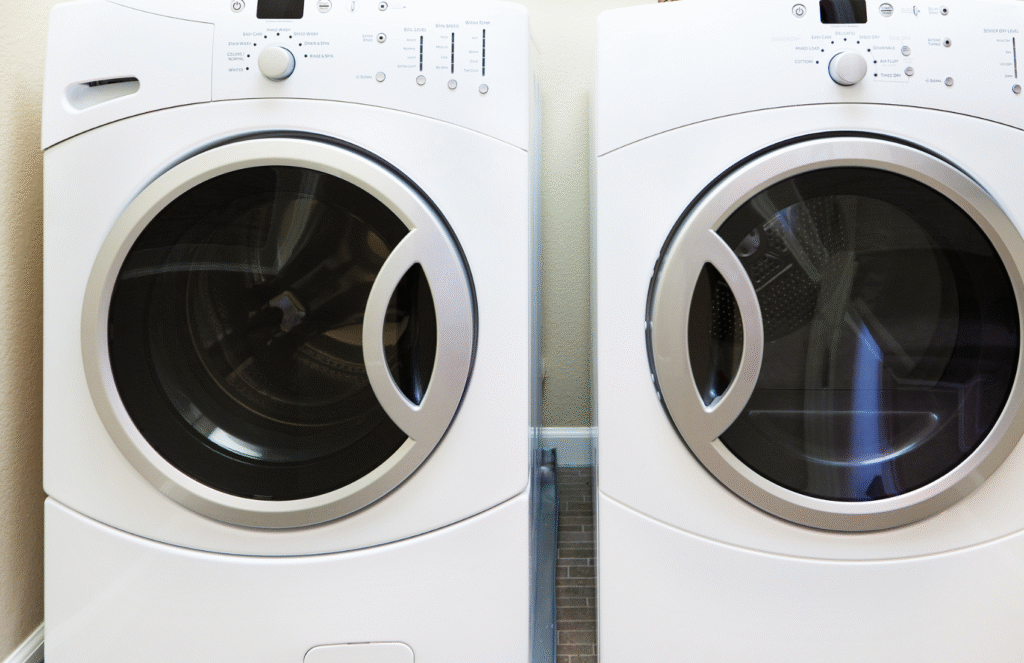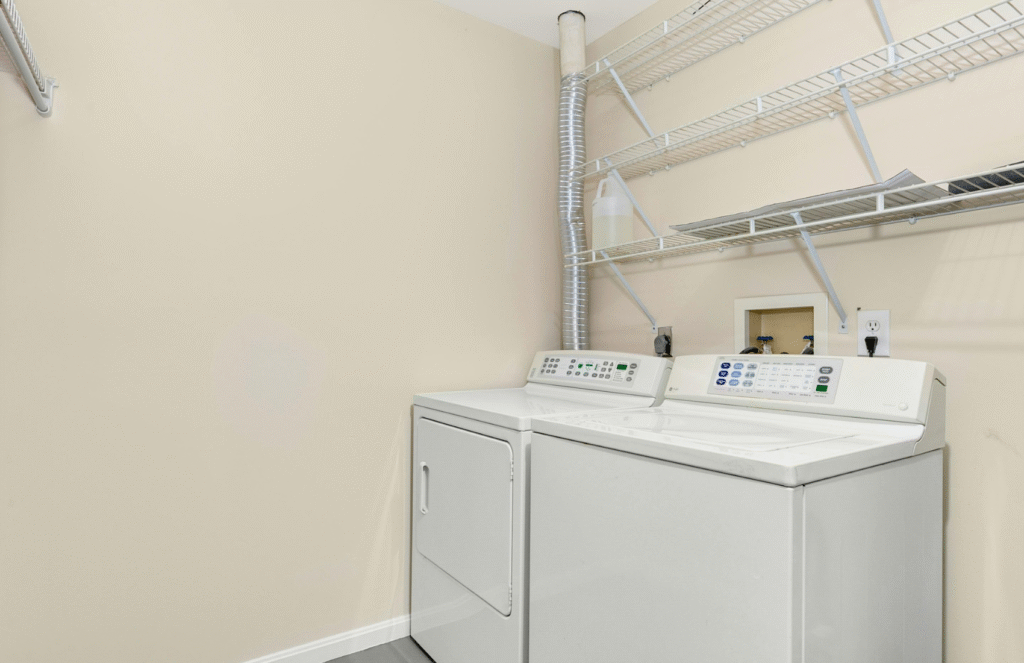After 15 years of helping Edwardsville families dispose of their old appliances, we’ve seen it all – from washing machines that died mid-cycle with a basement full of soapy water to dryers that decided to quit just as winter arrived. The question we hear most often? “What am I supposed to do with these massive appliances now?”
If you’re staring at a broken washer or dryer (or both), you’re probably wondering about the best way to handle disposal. Simply dragging them to the curb isn’t an option in most areas, and for good reason. These appliances contain valuable materials that can be recycled, plus components that shouldn’t end up in landfills.
Here’s everything you need to know about washer dryer disposal, based on real experience helping thousands of customers find the right solution for their situation and budget.
Why Proper Washer and Dryer Disposal Actually Matters
Before diving into your options, let’s talk about why this matters beyond just getting these appliances out of your way.
Environmental Impact You Can’t Ignore
Your old washer and dryer contain approximately 150-200 pounds of steel, plus aluminum, copper wiring, and various plastics. When these materials end up in landfills, we lose the opportunity to recycle them into new products. More concerning, some older appliances contain small amounts of heavy metals and chemical residues that can leach into groundwater over time.
We’ve worked with environmental groups to track the impact, and the numbers are eye-opening. A single washing machine contains enough steel to make about 30 new steel cans, while the copper in both appliances combined could wire a small room addition.
Legal Requirements That Catch People Off Guard
Here’s something many homeowners don’t realize until it’s too late – most municipalities have specific regulations about appliance disposal. We’ve had customers receive fines ranging from $150 to $300 for placing appliances at the curb on regular trash day.
In our service area, we’ve seen enforcement increase significantly over the past five years. Code enforcement officers now actively patrol neighborhoods, especially during spring cleaning season when appliance abandonment spikes.
Safety Considerations From Real Experience
Last month, we helped a customer whose father-in-law attempted to move a washer down basement stairs alone. The result? A torn rotator cuff and a damaged staircase. These appliances typically weigh 150-250 pounds each, and washers still contain water even after “draining.”
Beyond weight, older dryers may have gas connections that require professional disconnection, and all appliances have sharp edges and electrical components that pose risks during DIY removal.
Your 6 Best Options for Washer Dryer Disposal
After handling thousands of appliance disposals, we’ve identified six main approaches that actually work for different situations and budgets.
1. Professional Electronics Recycling Services (Our Recommendation)
Best for: Busy homeowners, multiple appliances, or when you want guaranteed responsible disposal
This is our bread and butter, and frankly, it’s often the smartest choice. Professional services like ours handle everything from disconnection assistance to ensuring your appliances are properly recycled rather than dumped.
What to expect: Most reputable services will schedule a convenient pickup time, often within 2-3 days. We typically charge $75-125 for a washer and dryer pair, depending on access difficulty and your location. That might seem steep initially, but consider what your time is worth, plus the peace of mind knowing everything is handled legally and responsibly.
Real experience: Last week, we helped a family in Glen Carbon whose washer died during a kitchen renovation. With contractors in and out, they needed the appliance gone quickly without adding chaos. We scheduled around their contractor timeline and handled everything while they were at work.
The process: We bring our own equipment and crew, disconnect if needed (though we recommend having utilities disconnected beforehand), and provide a certificate of responsible disposal for your records.
2. Retailer Take-Back Programs
Best for: When you’re purchasing replacement appliances
Most major appliance retailers now offer haul-away services when delivering new appliances. Home Depot, Lowe’s, Best Buy, and local appliance stores typically charge $25-50 per appliance for this service.
Our experience with customers: This works well when timing aligns perfectly – new appliances arrive, old ones leave the same day. However, we’ve seen frustrations when delivery teams aren’t equipped for difficult removals (like basement installations) or when the old appliances aren’t in the same location as the new ones.
Pro tip: Always confirm the removal service can handle your specific situation. We’ve been called to help when delivery teams couldn’t navigate narrow staircases or when customers had gas dryers requiring disconnection.
3. Manufacturer Recycling Programs
Best for: Environmentally conscious consumers with brand loyalty
Several manufacturers have stepped up their recycling game. Whirlpool’s program, for example, partners with local recyclers to ensure responsible disposal. Samsung offers periodic trade-in events with credits toward new purchases.
Reality check: These programs often have limited availability and specific requirements. We’ve seen customers wait months for scheduling or discover their appliance model isn’t eligible. The environmental benefit is excellent, but convenience can be lacking.
4. Municipal Collection Programs
Best for: Budget-conscious disposal when timing isn’t critical
Many municipalities offer seasonal appliance collection events or permanent drop-off locations. Costs typically range from free to $20 per appliance.
Our local experience: Madison County’s periodic collection events draw hundreds of residents throughout the year. The challenge? Limited scheduling, and you must transport appliances yourself. We often get calls from people who missed the event or couldn’t manage the transport.
Research tip: Call your city’s waste management department directly. Website information is often outdated, and programs change frequently.
5. Scrap Metal Dealers
Best for: DIY-minded individuals looking to recoup some value
If you’re willing to invest time and effort, scrap dealers will pay for the metal content in your appliances. Current rates in our area run $20-60 for a washer/dryer pair, depending on market prices.
The reality: This requires significant preparation. You’ll need to remove all non-metal components (plastic tubs, rubber hoses, electronic controls), which can take several hours and requires tools. Plus, you’re responsible for transportation.
When it makes sense: We’ve seen this work well for customers who enjoy DIY projects or have pickup trucks and spare time. One customer made it a weekend project with his teenage sons – they learned about appliance construction while earning some money.
6. Donation and Resale Options
Best for: Working appliances or those needing minor repairs
If your appliances still function, donation can be rewarding. Habitat for Humanity ReStore, local charities, and sometimes Craigslist buyers are interested in working units.
Requirements: Most organizations want appliances less than 10 years old that are clean and functional. Some will accept units needing minor repairs if you’re upfront about the issues.
Tax benefits: Keep documentation for potential tax deductions. A working washer/dryer pair might qualify for a $200-400 deduction, depending on age and condition.
Preparing Your Appliances for Disposal
Regardless of which disposal method you choose, proper preparation makes everything smoother and safer.
Safety First – Disconnection Procedures
For washers, turn off water supply valves and disconnect inlet hoses. Most units have a drain cycle to remove remaining water, but expect some spillage. Electric dryers need unplugging, while gas dryers require professional disconnection of the gas line – this isn’t a DIY job.
Our safety recommendation: If you’re uncomfortable with any disconnection step, hire a professional. We’ve seen too many water damage incidents from botched disconnections.
Documentation Worth Keeping
Before disposal, note model and serial numbers for warranty records and tax documentation if donating. Remove any personal items – we once found $47 in change and a lost wedding ring during appliance prep.
Physical Preparation Steps
Clean appliances thoroughly, especially if donating or selling. Secure any loose parts like lint screens or water inlet filters. Measure doorways and plan your removal route – we’ve seen appliances that went in during construction but won’t come out without modifications.
Planning for Access Challenges
Basement installations often require the most planning. Measure stairway width, ceiling height, and any turns. If appliances originally entered through a bulkhead or were installed before basement finishing, professional removal might be your only option.
Understanding the True Costs
Let’s break down what each disposal method actually costs when you factor in your time and potential hidden expenses:
Professional service: $75-125 for the pair, but includes labor, transportation, and guaranteed responsible disposal.
Retailer haul-away: $25-50 per appliance, but only available with new purchases and may have access limitations.
Municipal programs: Free to $20, but requires your transportation and works around their schedule.
Scrap dealers: Potential $20-60 income, but requires 4-6 hours of prep work plus transportation.
DIY to dump: Seemingly cheap until you factor in disposal fees ($50-100), truck rental if needed ($40-80), and your time.
What Happens After Disposal: The Recycling Journey
Once your appliances leave your home, the recycling process is quite remarkable. Steel components get shredded and melted down for new products – your old washer might become part of a new car or building beam within months.
Copper wiring is particularly valuable, often recycled into new electrical components. Even the plastic components get processed into new products, though this varies by recycler capability.
At CJD E-Cycling, we partner with certified recyclers who provide detailed reporting on material recovery rates. Typically, 85-90% of each appliance gets recycled into new products rather than ending up in landfills.
Frequently Asked Questions
Can I put my washer and dryer on the curb for garbage pickup?
In most areas, no. Regular waste services typically don’t accept large appliances, and placing them curbside often violates local ordinances. Always check with your waste management company first.
How much does professional disposal cost?
Expect $50-150 for a washer/dryer pair, depending on your location and access difficulty. Services that charge significantly less might not be handling disposal responsibly.
What if my appliances still work?
Working appliances have several good options: donation to charities, selling through Craigslist or Facebook Marketplace, or gifting to friends or family members who might need them.
Do I need to remove the water and drain hoses?
Most disposal services prefer appliances disconnected but don’t require you to remove hoses. If you’re transporting appliances yourself, removing hoses prevents leaks and makes handling easier.
Making the Right Choice for Your Situation
After helping thousands of customers with washer dryer disposal, the best choice depends on your priorities. If convenience and guaranteed responsible disposal matter most, professional services are worth the investment. If you’re budget-conscious and have time flexibility, municipal programs or scrap dealers might work better.
For most busy homeowners, professional disposal offers the best balance of convenience, safety, and environmental responsibility. You get your space back quickly, avoid potential legal issues, and know your appliances are being recycled properly.
Ready to get those old appliances out of your way? CJD E-Cycling has been serving the Edwardsville area for over a decade, providing reliable, responsible appliance disposal services. We handle everything from pickup scheduling to final recycling, so you can focus on more important things.
Contact us today for a quick quote and scheduling. Your basement, laundry room, and back will thank you.


